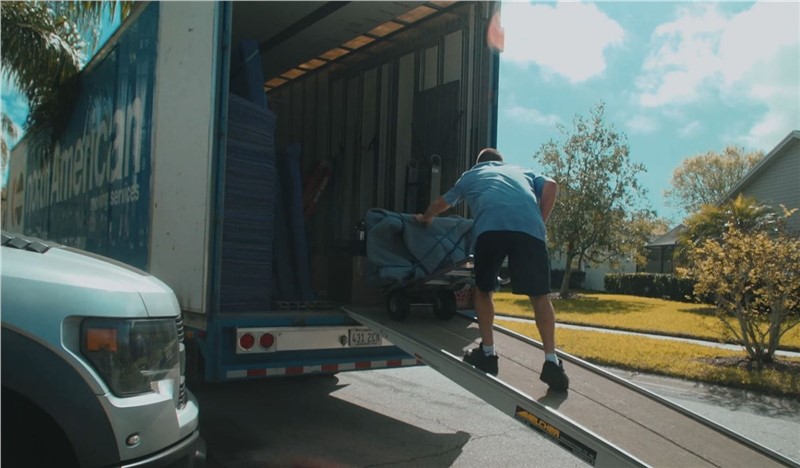Recognizing the Inclusions of moving and Freight Forwarding in the World of Residential and Global Shipping
Guiding with the complexities of moving and Freight forwarding can be challenging. Both procedures include distinct treatments and demands that are important for successful transport. Recognizing the differences in logistics, documentation, and threat administration is vital for companies and people alike. This expertise can considerably affect the effectiveness and safety of deliveries. Many are not aware of the certain components that affect the general experience and outcomes. What elements should one consider to assure a smooth transition?
The Basics of moving and Freight Forwarding
moving and Freight forwarding are basic elements of the global logistics sector. They assist in the transfer of products and individual items throughout global and domestic borders. moving largely involves the relocation of households or people, encompassing industrial and residential demands. It generally consists of packaging, filling, transferring, and unloading things at the destination. In contrast, Freight forwarding is focused on the delivery of products, frequently wholesale, utilizing different transport settings, such as land.freight, sea, or air forwarders serve as intermediaries, coordinating logistics to ensure timely distribution while steering through complex policies and custom-mades treatments. Both processes need cautious preparation, company, and interaction to guarantee effectiveness and decrease disturbances. Understanding these fundamentals is crucial for any individual included in logistics, as they lay the foundation for advanced facets of delivery and transportation management.
Key Parts of Freight Forwarding Solutions
Freight forwarding solutions incorporate a number of critical components that guarantee smooth transportation of products. Trick responsibilities of Freight forwarders include handling logistics, working with shipments, and managing customs clearance. Furthermore, recognizing essential shipping documents is necessary for conformity and effective activity of cargo.
Freight Forwarder Responsibilities
A dependable Freight forwarder plays a crucial duty in coordinating the transportation of items, ensuring that shipments are dealt with successfully and in compliance with laws. Their responsibilities include different vital jobs, consisting of choosing excellent transport courses, bargaining Freight prices, and taking care of logistics. They function as middlemans in between shippers and providers, making sure that freight is correctly packaged and classified for safe transportation. Additionally, Freight forwarders track shipments, giving updates to clients concerning the status and expected delivery times. They additionally evaluate and take care of threats related to transport, recommending insurance policy options as required. By assisting in communication and paperwork, Freight forwarders simplify the delivery process, minimizing possible delays and improving general supply chain performance.
Shipping Paperwork Fundamentals

Understanding Customizeds Clearance and Documentation
Exact paperwork is crucial in the customizeds clearance process, as it assures conformity with different guidelines. An overview of customs laws highlights the intricacies faced by shippers and Freight forwarders. Usual clearance challenges can substantially impact shipment timelines and expenses, making understanding this aspect important for effective logistics.
Significance of Accurate Paperwork
Guiding via the intricacies of worldwide delivery requires an eager understanding of customs clearance and the crucial role of documents. Accurate documents is crucial for guaranteeing that shipments adhere to laws and reach their locations right away. Appropriately prepared files, consisting of expenses of lading, commercial invoices, and packaging lists, facilitate smooth communications with customs authorities. Mistakes can lead to delivery delays, fines, or even confiscation of goods. Extensive documentation aids in tracking shipments and fixing disagreements. Businesses engaged in moving and Freight forwarding must focus on meticulous documents techniques to navigate the detailed landscape of worldwide delivery effectively. This persistance not just streamlines procedures yet additionally improves customer fulfillment by making certain prompt distribution.
Customizeds Rules Overview
Guiding customizeds policies is an important element of worldwide trade that straight affects the success of moving and Freight forwarding procedures. Efficient customs clearance needs an understanding of various regulations, including tolls, obligations, get more and import/export restrictions. Accurate documents is essential, as it assures conformity with legal needs and assists in the reliable movement of items across boundaries. Secret documents often consist of commercial billings, packing listings, and bills of lading, which give in-depth information concerning the shipment. Furthermore, customizeds brokers play a crucial duty in steering intricate guidelines, acting as middlemans in between custom-mades and shippers authorities. By preserving extensive understanding of personalizeds processes, businesses can considerably decrease delays and decrease expenses related to worldwide shipping.
Common Clearance Obstacles
Numerous obstacles can develop throughout the custom-mades clearance process, often making complex the activity of items across boundaries. One considerable issue is not enough documentation, which can lead to charges and delays. Exporters and importers must guarantee all needed paperwork, such as billings, packaging lists, and certifications of origin, is total and precise. Additionally, discrepancies in valuation can activate scrutiny from customizeds authorities, causing added obligations or evaluations. Language barriers might also pose difficulties, as miscommunication can cause misconceptions pertaining to regulations. Changes in personalizeds laws can develop complication, requiring continuous watchfulness by shippers. Inevitably, getting over these clearance tests needs extensive preparation and a clear understanding of customs needs to assist in smooth worldwide transactions.
Product Packaging and Identifying Requirements
Frequently overlooked, product packaging and labeling requirements play an essential function in the shipping procedure, guaranteeing that items are secured and easily recognizable throughout their journey (overseas movers). Correct packaging safeguards things from damage throughout transit, while additionally assisting in efficient handling and storage. Making use of proper materials, such as bubble cover, foam, or sturdy boxes, can stop breakage and loss.Labeling is similarly vital. Exact and clear labels communicate important details, including the location, dealing with instructions, and components. Labels must conform with regulations details to residential and worldwide shipping, which might include unsafe products recognition or customs declarations.Moreover, standard labeling practices streamline the monitoring process and improve total logistics effectiveness. By sticking to packaging and labeling requirements, services reduce the threat of delays, damages, or misdelivery. Inevitably, these methods add greatly to the success of moving and Freight forwarding procedures, making sure a smooth delivery experience for all events entailed
Tracking Deliveries: Relevance and Approaches
Reliable product packaging and labeling established the structure for effective delivery monitoring, yet tracking deliveries is just as essential in the shipping procedure. Delivery monitoring gives real-time visibility, which helps businesses and consumers keep track of the progress of their goods. This transparency boosts consumer complete satisfaction, considering that customers can remain educated regarding shipment timelines and any kind of possible delays.Several approaches promote effective tracking. Barcode scanning is a common approach, using special identifiers to check plans throughout their trip. In addition, general practitioner modern technology makes it possible for precise area tracking, enabling for prompt updates and boosted logistics management. Lots of delivery firms currently use digital platforms and mobile applications that supply individuals with very easy accessibility to tracking information.The significance of shipment monitoring can not be overemphasized; it reduces the risk of shed or harmed goods, enhances functional efficiency, and cultivates trust fund in between shippers and recipients. Integrating reliable monitoring methods is essential for successful domestic and global delivery operations.
Insurance policy Options for Your Goods
Securing insurance policy for items en route is a vital consideration for people and businesses alike. Insurance coverage alternatives differ based on the kind of shipment, worth of items, and specific risks included. Typical kinds consist of service provider liability, which covers loss or damage while en route, and full-value insurance coverage, giving extensive coverage for the total value of the goods.Shippers may likewise take into consideration aquatic insurance policy for international shipments, safeguarding against dangers connected with sea transportation. It is necessary to evaluate the particular requirements of important link the shipment and examine the terms and problems of any kind of policy.Furthermore, understanding exemptions and constraints is crucial to prevent prospective voids in coverage. Shippers ought to engage with insurance coverage specialists to discover customized options that fit their one-of-a-kind scenarios. Ultimately, buying the ideal insurance policy can minimize financial risks and supply satisfaction throughout the shipping process.
Choosing the Right moving and Freight Forwarding Service
When picking a relocating and Freight forwarding solution, it is crucial for people and organizations to carefully evaluate their details needs and top priorities. Variables such as the quantity of items, location, and timeline play a considerable function in this decision-making process. Researching various service providers is a good idea; comparing their services, rates, and consumer testimonials can expose valuable insights.Additionally, it is essential to take into consideration the experience and experience of the solution company in managing certain kinds of freight, specifically for global deliveries that might entail personalizeds clearance. Openness in rates, including any kind of covert costs, ought to additionally be scrutinized.Furthermore, assessing the degree of customer support supplied is necessary, as timely interaction can minimize issues throughout transportation (lcl shipping). Verifying the schedule of insurance choices assures that items are protected throughout the shipping process. By taking these actions, people and companies can make informed options that line up with their logistics needs
Often Asked Questions
What Kinds Of Goods Can Be Shipped Internationally?

Exactly How Do Shipping Expenses Range Different Service Providers?
Shipping prices differ greatly in between carriers because of aspects such as service rate, cargo kind, distance, and additional solutions provided. Each service provider's prices version reflects these variables, affecting overall shipping expenditures for customers.
Can I Ship Hazardous Products or Perishables?
Delivering dangerous products and perishables is subject to stringent laws. Providers often need details packaging, labeling, and paperwork. Carriers must ensure conformity with local and worldwide legislations to prevent fines and guarantee risk-free transportation.
What Should I Do if My Delivery Is Postponed?
When faced with a shipment delay, one need to initially call the service provider for updates. Then, examine any type of alerts received, examine alternate remedies, and keep all events informed about the circumstance to reduce interruptions.
Are There Weight Limits for Shipping Containers?
Weight limitations for delivery containers differ relying on variables like container size and shipping guidelines. Usually, typical containers have a maximum gross weight of around 30,000 to 32,000 kgs to ensure secure transport and handling. In comparison, Freight forwarding is concentrated on the delivery of products, commonly in mass, utilizing various transportation modes, such as sea, air, or land.freight forwarders act as intermediaries, collaborating logistics to ensure timely delivery while maneuvering with complex policies and customs procedures. Key responsibilities of Freight forwarders consist of managing logistics, coordinating shipments, and managing customizeds clearance. A trusted Freight forwarder plays an essential role in collaborating the transportation of products, guaranteeing that shipments are handled efficiently and in conformity with policies. Reliable packaging and labeling set the structure for successful delivery management, but tracking deliveries is equally crucial in the shipping procedure. Numerous delivery business currently provide electronic platforms and mobile applications that supply users with simple accessibility to tracking information.The value of delivery tracking can not be overemphasized; it minimizes the danger of shed or damaged products, boosts operational performance, and fosters depend on between recipients and carriers.